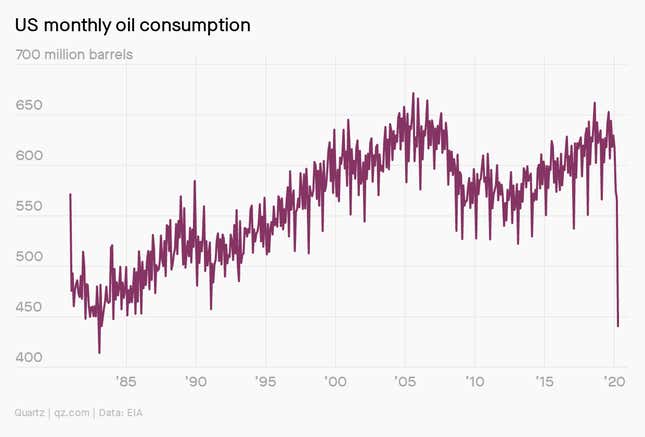Good morning, Quartz readers!
Here’s what you need to know
Hundreds of protesters were arrested in Hong Kong. Thousands took to the streets in violation of a ban on this year’s July 1 march to mark the end of British rule. The new security law—which essentially covers China’s critics anywhere in the world—was the justification for at least 10 of the arrests. The UK offered residency to any Hong Konger born before 1997.
China and the US continued a series of escalating retaliations. The US is reportedly preparing sanctions against senior Chinese officials over the country’s human rights abuses in Xinjiang. Meanwhile, China responded to recent US restrictions on its news outlets by demanding information on the Chinese operations of the Associated Press, CBS News, National Public Radio, and United Press International.
Tech firms try to move on from past missteps. SoftBank Group wants out of its five-year agreement with Wirecard, the German payments company recently revealed to be missing $2 billion. Luckin Coffee, which is also embroiled in a fraud scandal, said its internal audit is nearly done. Samsung settled a facial recognition patent lawsuit in the US, but Zoom missed its own deadline for publishing a report on government demands for user data.
It looks like there’ll be another 16 years of president Putin. Preliminary results from Russia’s referendum showed voters overwhelmingly approved constitutional amendments that would allow the strongman to stay in office until 2036.
Quartz updated its homepage. We’re incorporating the magic of our email newsletters into qz.com.
A different kind of TikTok challenge
This week, India banned 59 Chinese apps, including the popular video sharing platform TIkTok, in an attempt to “safeguard” its mobile and internet users. The Quartz India team broke down how we got here and what it all means:
🎢 TikTok’s history in India has been a bit of a roller coaster journey.
⭐️ The ban could be bad news for India’s TikTok stars—unless they diversify.
📱 An app developed by Bengaluru techies has gained popularity as TikTok’s desi alternative (✦ Quartz member exclusive)
🥇 But there’s no match for TikTok’s popularity in India yet.
💊 The ban gives China a taste of its own medicine.
🤝 It might mean the end of Narendra Modi’s social media diplomacy in China (he quit Weibo on Wednesday).
🎭 While Indian startups funded by Alibaba and Tencent are backing the ban (✦).
Charting US oil’s collapse

We’ve never seen a collapse like this. US oil consumption in April fell off a cliff, plumbing depths not reached since 1983. At the time, the US economy was coming off of a painful bout of inflation and leaving behind years of economic recession. The numbers, according to new data from the US Energy Information Administration, likely represent the nadir of US demand after the coronavirus virtually shut down large swaths of the country.
The drop occurred across nearly all types of oil use, from gasoline for cars to asphalt and lubricants. Petrochemicals, used for products like plastic bags and masks, were one of the only oil-based products to see a slight uptick.
For members: Changing trains in Japan
In the weeks since the Japanese government lifted the country-wide state of emergency, life is quickly returning to normal in the Japanese capital’s train stations. But is that normal a normal we should be returning to? So packed are Tokyo’s trains that anxious commuters are posting photos of cramped cars on social media with the hashtag “crowded train.” Even without a global pandemic to worry about, it’s not ideal.
Change is coming to Japan’s transit systems, if slowly. Read more about how the coronavirus pandemic is weakening the office’s grip on Japanese commuters (✦) in our field guide on the commuting revolution.
✦ If your reading list lately feels like an overstuffed train, a Quartz membership is a great way to pare it down to what you need to know about the changes facing the global economy. And to keep things completely economical, it’s on sale for 50% off! ✦
We’re obsessed with home offices
You better work. Lately, many workers have had no choice but to juggle their 9-5 office duties with their domestic circuses. Despite our modern conceptions of an office, working from home was the norm for centuries. With no foolproof reopening solutions in sight, it appears that home offices—in whatever scale—will be a standard design feature of our homes, even after the pandemic. It’s not ideal, but it doesn’t need to be so bad either. Pull up a (kitchen table) chair, it’s the Quartz Weekly Obsession.
Get the Obsession in your inbox every week by hitting the button below. 👇
Surprising discoveries
A national mask mandate could reduce US GDP losses by 5%. Goldman Sachs crunched the numbers, and it turns out health really is wealth.
A mysterious shopper has been toying with online retailers for months. “John Smith” has abandoned thousands of online shopping carts.
A Michigan bill would let employers microchip workers. So long as it’s voluntary.
Influencers have their own trade association now. The American Influencer Council plans to advance consumer transparency, professional ethics, and public goodwill.
US prisoners are going viral on TikTok. Their videos are a mix of funny skits and exposés on life behind bars.
Our best wishes for a productive day. Please send any news, comments, abandoned shopping carts, and TikTok challengers to hi@qz.com. Get the most out of Quartz by downloading our app on iOS or Android and becoming a member. Today’s Daily Brief was brought to you by Michael Coren, Dan Kopf, Jackie Bischof, Susan Howson, and Liz Webber.